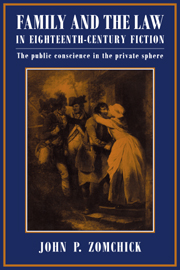Book contents
- Frontmatter
- Contents
- Preface
- Acknowledgments
- 1 Introduction
- 2 Roxana's contractual affiliations
- 3 Clarissa Harlowe: caught in the contract
- 4 Tame spirits, brave fellows, and the web of law: Robert Lovelace's legalistic conscience
- 5 Roderick Random: suited by the law
- 6 Shadows of the prison house or shade of the family tree: Amelia's public and private worlds
- 7 The embattled middle: longing for authority in The Vicar of Wakefield
- 8 Caleb Williams: negating the romance of the public conscience
- Bibliography
- Index
8 - Caleb Williams: negating the romance of the public conscience
Published online by Cambridge University Press: 10 February 2010
- Frontmatter
- Contents
- Preface
- Acknowledgments
- 1 Introduction
- 2 Roxana's contractual affiliations
- 3 Clarissa Harlowe: caught in the contract
- 4 Tame spirits, brave fellows, and the web of law: Robert Lovelace's legalistic conscience
- 5 Roderick Random: suited by the law
- 6 Shadows of the prison house or shade of the family tree: Amelia's public and private worlds
- 7 The embattled middle: longing for authority in The Vicar of Wakefield
- 8 Caleb Williams: negating the romance of the public conscience
- Bibliography
- Index
Summary
In society, no man possessing the genuine marks of a man can stand alone. Our opinions, our tempers and our habits are modified by those of each other. This is by no means the mere operation of arguments and persuasives; it occurs in that insensible and gradual way which no resolution can enable us wholly to counteract. He that would attempt to counteract it by insulating himself will fall into a worse error than that which he seeks to avoid. He will divest himself of the character of a man, and be incapable of judging his fellow men, or of reasoning upon human affairs.
On the other hand, individuality is of the very essence of intellectual excellence. He that resigns himself wholly to sympathy and imitation can possess little of mental strength or accuracy … he is incapable of the enterprise of a hero, or the severity of a philosopher. Mankind cannot be benefited by him.
Introduction
I have chosen to end this study with William Godwin'sThings as They Are; or, The Adventures of Caleb Williams because it is the negation of both the fortunate and unfortunate juridical narrative paradigms found in the other novels of this study. Despite their criticism of social conditions, the other novels end by generally affirming society's juridical structures and recommending, as it were, the subject appropriate to such structures. Even Roxana attributes its heroine's ultimate disintegration to her violation of natural and revealed laws rather than to the contractual negotiations that endow her with a false sense of juridical immunity.
- Type
- Chapter
- Information
- Family and the Law in Eighteenth-Century FictionThe Public Conscience in the Private Sphere, pp. 177 - 192Publisher: Cambridge University PressPrint publication year: 1993



